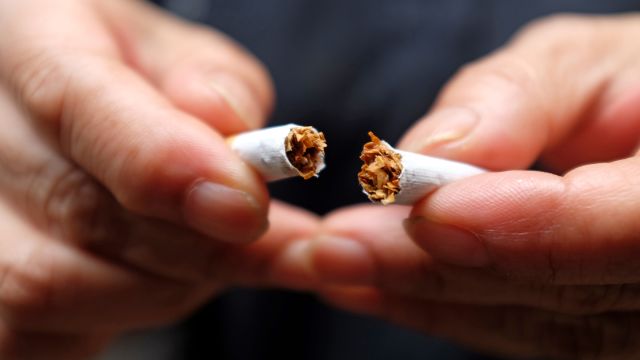You already know that smoking is bad for you. Lighting up can contribute to lung cancer, heart disease, emphysema and much more. Not to mention, smoking is hard on your wallet—some packs of cigarettes cost over $10!
The good news is that most people who smoke want to stop. According to Smoking Cessation: A Report of the Surgeon General, released in 2020, nearly 70 percent of adults who smoke want to kick the habit altogether—and just over half try to quit smoking each year.
But actually quitting is much easier said than done, and for most smokers, it takes multiple attempts. Fewer than 1 in 10 adults actually quit smoking each year.
“Learning not to smoke is kind of like learning to ride a bike,” says respiratory therapist Todd Drake of St. Mary’s Health Care System in Athens, Georgia, who teaches an American Lung Association Freedom From Smoking class and is an ex-smoker himself. “Very few people manage to quit on their first attempt, and usually it takes between five and seven tries to be successful.”
How do you know you’re ready to quit smoking? Fortunately, there are some simple questions you can ask yourself to gauge where you are in the process, as well as ways to stop smoking if you are ready to take that step.
How to know you’re finally ready to quit smoking
Before you begin your journey, it’s important that you take some time to think about whether you’re ready to quit—and why.
Here are some questions that may be included in any assessment you might take:
- Do I want to quit smoking for myself?
- Is quitting smoking my number one priority?
- Have I tried to quit smoking before?
- Do I believe smoking is dangerous to my health?
- Am I committing to trying to quit even though it may be difficult at first?
- Are my friends, family and coworkers willing to help?
- Besides health reasons, do I have other personal reasons to quit smoking?
- Will I be patient with myself while I’m trying?
You don’t have to answer yes to all eight questions to confirm you’re ready, says Drake. “Very few people do, if they’re honest. If you answer yes to four or more, you’re already on the path of being ready to quit.”
Building your motivation
Once you've established you're ready to quit smoking, establishing your motivation for quitting can be helpful. Try writing a list of reasons; doing so will help confirm your decision and can serve as a good reminder if you get the urge to light up again.
Some specific reasons for quitting might include:
- You’ll lower your risk of cancer, stroke, cataracts, heart disease and many more diseases
- You’ll save money
- You’ll regain your senses of smell and taste
- You look forward to improving the health of your skin
- You’ll have more energy for spending time with family and friends
- You know your family and friends will support you on this journey
Once you’ve identified your motivation and are committed to quitting, developing ways to stop smoking that are realistic and detailed is important.
You’re ready to quit. Now what?
For most people, having a plan is usually one of the most successful ways to stop smoking. The American Lung Association reports that just 4 to 7 percent of those who try to quit cold turkey—without a strategy or help in place—are successful. The rest of those who quit need a personalized plan.
Most smoking programs will walk you through a variety of steps to quit smoking and will typically:
- Help you establish a realistic quit date
- Connect you with a social network
- Teach you how to maintain your weight
- Work with you on relaxation techniques and tips
- Recommend ways to help you control your urge to smoke
- Suggest medications, nicotine gums, patches, nasal sprays, inhalers or lozenges that can ease withdrawal side effects
- Help you deal with triggers
Be prepared for obstacles
The stressors of everyday life combined with nicotine withdrawal can affect your plan to quit smoking. And if you’ve been smoking a while, the habit may be ingrained in many different parts of your day, says Drake. “Smokers tend to use the habit for stress relief, relaxation therapy—and even as a social activity.”
It’s good to be aware of things that might interfere with your efforts to quit. Withdrawal symptoms, cravings and certain smoking triggers—like people, activities or feelings—may increase the urge to smoke. Learning how to manage cravings and triggers is key.
And remember, if you fall off the wagon, you shouldn’t beat yourself up. It takes most people numerous attempts to successfully quit smoking.
“Part of the process is learning to understand and realize that people can relapse, but are usually very successful when they try again,” says Drake.
You can always call the National Cancer Institute’s toll-free tobacco quitline (1-800-QUIT-NOW) for counseling resources, medication information, tips to quit smoking and much more.







